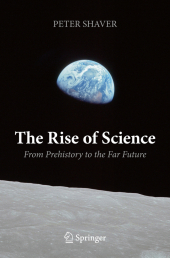 Neuerscheinungen 2018Stand: 2020-02-01 |
Schnellsuche
ISBN/Stichwort/Autor
|
Herderstraße 10
10625 Berlin
Tel.: 030 315 714 16
Fax 030 315 714 14
info@buchspektrum.de |

Peter Shaver
The Rise of Science
From Prehistory to the Far Future
1st ed. 2018. 2018. x, 279 S. 5 Farbabb. 235 mm
Verlag/Jahr: SPRINGER, BERLIN; SPRINGER INTERNATIONAL PUBLISHING 2018
ISBN: 3-319-91811-7 (3319918117)
Neue ISBN: 978-3-319-91811-2 (9783319918112)
Preis und Lieferzeit: Bitte klicken
How did science rise up to so dramatically change our world, and where will it take us in the future? This book gives a unique and broad overview. A brief history reveals the major phases and turning points in the rise of science from the earliest civilizations to the present: How was science ´discovered´? Why did it disappear a few times? When did it become ´modern´? A critical assessment examines how science actually ´happens´: the triumphs, the struggles, the mistakes and the luck.
Science today is endlessly fascinating, and this book explores the current exponential growth, curiosity-driven vs. goal-oriented research, big and small science, the support of science, the relation of science to society, philosophy and religion, and the benefits and dangers of science.
Finally a glimpse into the future: Will the current pace of science continue? Will we ever go backwards (again)? What remains to be discovered? Can science ever be complete? What can we imagine for the distant future?
This book will be of wide interest to the general reader as well as to students and working scientists.
This book provides a fresh, unique and insightful coverage of the processes of science, its impact on society and our understanding of the world, based on the author´s experience gained from a lifetime in science.
Ron Ekers, FRS, CSIRO Fellow, CSIRO Astronomy & Space Science, former President of the International Astronomical Union
Peter Shaver´s comprehensive and lively survey deserves a wide readership. Scientific discoveries are part of our global culture and heritage, and they underpin our lives. It´s fascinating to learn how they were made, and how they fit into the grand scheme. This book isn´t just for scientists - it´s written for all of us.
Martin Rees, FRS, Astronomer Royal, former President of the Royal Society and former Master of Trinity College, Cambridge
This book offers a wonderfully concise and accessible insight into science - its history, breadth and future prospects. Peter Shaver gives a feeling for what it actually means to be a practicing scientist.
Stephen Simpson, FRS, Academic Director, Charles Perkins Centre, School of Life and Environmental Sciences, University of Sydney
1. Introduction 7
Beyond our wildest dreams - what is science? - why do we do science? - pure and applied science - how do we know? - assumptions and conditions - the scope of science
2. A Brief History 27
Out of the mists of time - the early civilizations - the ´Greek Miracle´ - in transit - Islamic science - medieval science - the Scientific Revolution - the very large - the very small - light - life itself - our evolving perspectives
3. Roads to Knowledge 117
Curiosity - imagination - determination - solitude and teamwork - connections - cross-pollination - timing - technology - collecting - discovery - experiments and observations - hypotheses and theories - falsification and verification - bandwagons and paradigms - serendipity -mistakes - false positives - disagreements - proposals - publish or perish - opportunity - the essence of it all
4. Science Today 169
Exponential growth - curiosity-driven vs. goal-oriented research - big and small science - the support of science - international collaborations - a scientific career - science in everything - science and society - the power and perils of science - the global impact - science and the philosophy of science - science and religion - science in the information age - the massively interdependent world
5. Into the Future 249
Will the current pace of science continue? - will we ever go backwards (again)? - what remains to be discovered? - can science ever be complete? - the long view
Epilogue 277
Further Reading 279
Acknowledgements 293
Name Index 295
Subject Index 301


